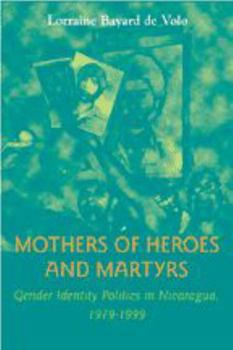Mothers of Heroes and Martyrs: Gender Identity Politics in Nicaragua, 1979-1999
Select Format
Select Condition 
Book Overview
How did a group of overwhelmingly poor, older women in a third-world country emerge to become a powerful force in their country's politics? Founded during the Nicaraguan revolution, the Mothers of Heroes and Martyrs of Matagalpa comprises women who supported the revolution but did not carry guns; who, in their words, gave up their loved ones to the struggle.
In this book Lorraine Bayard de Volo focuses on this group to reveal what she calls the dominant but rarely examined maternal identity politics of revolution, war, and democratization. Dividing Nicaraguan politics (1979-99) into four periods, Bayard de Volo uses both macro- and micro-levels of analysis to capture the dialectical relationship between large-scale political processes and the micropolitics of collective action. She shows how Sandinistas and anti-Sandinistas mobilized both mothers and maternal imagery and in turn analyzes how this imagery was adopted and manipulated by the Mothers of Heroes and Martyrs. Employing a feminist Gramscian approach to address the gendered nature of cultural politics and collective identity, the author shows how, in the battle to capture Nicaraguan hearts and minds, both sides relied primarily on maternal images of women. Such mobilizing identities propelled women into unprecedented levels of collective action, yet at the same time channeled them away from feminist priorities.
Related Subjects
Central America Comparative Politics Elections & Political Process Gay & Lesbian Gender Studies Government History International Relations Latin America Legal Theory & Systems Modern (16th-21st Centuries) Nicaragua Non-US Legal Systems Political Science Politics & Government Politics & Social Sciences Social Sciences Women in History




